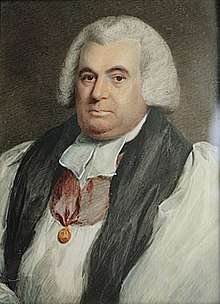Samuel Horsley
Samuel Horsley (15 September 1733 – 4 October 1806) was a British churchman, bishop of Rochester from 1793. He was also well versed in physics and mathematics, on which he wrote a number of papers and thus was elected a Fellow of the Royal Society in 1767; and secretary in 1773, but, in consequence of a difference with the president (Sir Joseph Banks) he withdrew in 1784.
Samuel Horsley | |
|---|---|
| Bishop of St Asaph | |
 | |
| Church | Church of England |
| Diocese | Diocese of St Asaph |
| Elected | 1802 |
| Predecessor | Lewis Bagot |
| Successor | William Cleaver |
| Other posts | Bishop of Rochester 1793–1802 Dean of Westminster 1793–1802 Bishop of St David's 1788–1793 |
| Personal details | |
| Born | 15 September 1733 London |
| Died | 4 October 1806 (aged 73) Brighton |
| Nationality | British |
| Denomination | Anglican |
| Profession | Scholar |
| Alma mater | Trinity Hall, Cambridge |
Entering Trinity Hall, Cambridge in 1751, he became LL.B. in 1758 without graduating in arts.[1] In the following year he succeeded his father in the living of Newington Butts in Surrey. In 1768 he attended the son and heir of the 3rd Earl of Aylesford to Oxford as private tutor; and, after receiving through the earl and Bishop of London various minor preferments, which by dispensations he combined with his first living, he was installed in 1781 as archdeacon of St Albans.
Horsley now entered on his controversy with Joseph Priestley, who denied that the early Christians held the doctrine of the Trinity. In this fierce debate, Horsley's aim was to lessen the influence which Priestley's name gave to his views, by pointing to (what he claimed were) inaccuracies in his scholarship. Horsley was rewarded by Lord Chancellor Thurlow with a prebendal stall at Gloucester; and in 1788 Thurlow procured his promotion to the see of St David's.
As a bishop, Horsley was active both in his diocese, and in parliament. The effective support which he afforded the government was acknowledged by his successive translations to Rochester in 1793, and to St Asaph in 1802. With the see of Rochester he held the deanery of Westminster.
Works
Besides the controversial Tracts, which appeared in 1783–1785, 1786, and were republished in 1789 and 1812, Horsley's more important works are:
- Apollonii Pergaei inclinationum libri duo (1770)
- Remarks on the Observations ... for determining the acceleration of the Pendulum in Lat. 7o 51' (1774)
- Isaaci Newtoni Opera quae extant Omnia, with a commentary (5 vols 4to, 1779–1785)
- On the Incarnation. A Sermon, Preached in the Parish Church of St. Mary Newington, in Surrey, Dec. 25, 1785
- A Sermon Preached in the Cathedral Church of St. Paul (1789)
- A Review of the Case of the Protestant Dissenters with Reference to the Corporation and Test Acts (1790)
- A Sermon Preached Before the Incorporated Society for the Propagation of the Gospel in Foreign Parts (1795)
- On the Prosodies of tke Greek and Latin Languages (1796)
- Disquisitions on Isaiah xviii. (1796)
- Hosea, translated ... with Notes (1801)
- Elementary Treatises on ... Mathematics (1801)
- Euclidis elernentorum libri priores XII. (1802)
- Euclidis datorum liber (1803)
- Virgil's Two Seasons of Honey, &c. (1805)
- papers in the Philosophical Transactions from 1767 to 1776
After his death there appeared several collections edited by Heneage Horsley:
- (1810–1812)
- Speeches in Parliament (1813)
- Book of Psalms, translated with Notes (1815)
- The watchers and the holy ones, a sermon, Volume 17 (1816)
- Biblical Criticism (1820)
- [https://books.google.com/books?id=iaYGAAAAQAAJ&printsec=frontcover#v=onepage&q&f=false Sermons. Nine sermons on our Lord's resurrection, and A dissertation on the prophecies of the Messiah dispersed among the heathen (1829)
- Collected Theological Works (6 vols 8vo, 1845).
References
- "Samuel Horsley (HRSY751S)". A Cambridge Alumni Database. University of Cambridge.

External links
- Works by or about Samuel Horsley in libraries (WorldCat catalog)
- "Archival material relating to Samuel Horsley". UK National Archives.

| Church of England titles | ||
|---|---|---|
| Preceded by Edward Smallwell |
Bishop of St David's 1788–1793 |
Succeeded by William Stuart |
| Preceded by John Thomas |
Bishop of Rochester 1793–1802 |
Succeeded by Thomas Dampier |
| Dean of Westminster 1793–1802 |
Succeeded by William Vincent | |
| Preceded by Lewis Bagot |
Bishop of St Asaph 1802–1806 |
Succeeded by William Cleaver |
